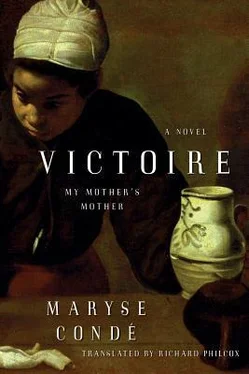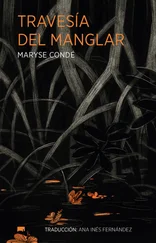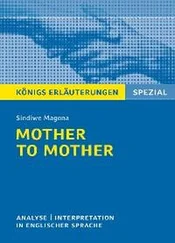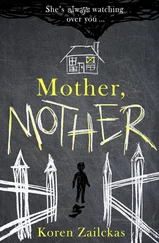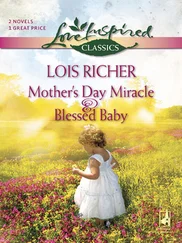Sèl kafé di kalité, sé kafé Gwadloup. (The only quality coffee is coffee from Guadeloupe.)
Alas, in the wake of a hurricane, Marie-Galante lost all its coffee and cotton plants. The family had now turned to sugar while in La Pointe Monsieur Souques was preparing to nose out all the factory owners with his Darboussier plant. They were thus living sparingly at Maule. In their elegant house made of solid wood with a roof of wooden tiles, Rochelle rationed the oil and rice for meals and lit only one paraffin lamp to light twelve rooms. Victoire was unable to present any references and what’s more was pregnant. No problem! Two excellent reasons to underpay her!
The Dulieu-Beauforts had managed to engage their eldest daughter, Anne-Marie, a sixteen-year-old beauty, to Boniface Walberg, whose ups and downs in the sugar industry had prompted him to become a trader on the quai Lardenoy in La Pointe. Outraged at being sold to a man she despised for his lack of musical education, Anne-Marie locked herself in her room with her viola and played and played.
Strange, this passion for music in a materialist family! A loving godmother, on noticing her unusual ear for music, had given her a violin on her fourth birthday. She slept with it tight between her legs. It was the first thing she grabbed hold of on wakening. She had forced her parents to send her to the conservatoire in Boulogne, near Paris. Besides the violin, she was learning to play the guitar and the recorder when the family ruin obliged her to return to Marie-Galante. Ever since, she had made a good job of making herself loathsome to everyone.
Anne-Marie didn’t take long noticing the new cook. Not because she could rustle up a sublime gumbo, a creamy concoction obtained by adding additional okra leaves, but because twice she had entered her room unexpectedly and surprised Victoire, holding her viola to her shoulder.
“Do you like my music?” she had asked, surprised.
“Oui, mamzel,” Victoire had whispered.
Do the blacks have an ear for things other than the bamboula ? If yes, this would back up Anne-Marie’s theory that there should be no hierarchy between different types of music. Those who called the gwo ka, bèlè , merengue, or mazouk a lot of bamboula , in other words primitive music, exasperated her. Their rhythms were different from a sonata or a symphony, that’s all. However, she hadn’t had time to verify the exactitude of her audacious point of view since Victoire, pushing in front of her a belly that now could not be ignored, had run out.
Thus was born a solid, mysterious relationship that must have exasperated and set quite a number of people talking. It was only to end with the death of Victoire, called to God long before Anne-Marie, who ended her life obese and ninety years old. But we will come back to that.

My mother was born on April 28, 1890, at four o’clock in the morning.
Victoire christened her Jeanne Marie Marthe. I have no idea what motivated her choice of this string of first names.
When she went into labor the evening before, Dodose Quidal, the midwife, looked in and then left, predicting the child would not come into this world just then. She proved to be right. The next time Dodose pushed open the door of her cabin, Victoire was expulsing her daughter in a flow of blood and fecal matter. We know that any birth is a butchery. The child weighed six and a half pounds. As soon as she emerged from her mother’s womb, she was beautiful, my mother. A skin as soft as a sapodilla, a mass of hair more curly than frizzy or downright kinky, at least to begin with, for things were to change when she was seven or eight, a perfectly oval face, a high forehead, sparkling almond-shaped eyes, prominent cheekbones, and a well-defined mouth. She was the spitting image of her father. Once Dodose had wiped her with a cloth, she laid her on her mother’s chest, where the baby greedily guzzled on a breast. It was then that Victoire burst into tears. For the very first time.
She hadn’t cried when Caldonia died.
She hadn’t cried when Dernier ran away. I use this verb, “ran,” although we will never know for certain whether Dernier ever knew about her pregnancy.
She hadn’t cried when the Jovials threw her out like a slut.
She hadn’t cried when Thérèse left for France barricaded in bitterness and hatred.
Was it then, through her tears, that she swore to her daughter she would watch over her and give her every possible chance in life so that nobody would ever trample on her daughter like they had trampled on her? Education, education, swear to God, would be her emancipation. Her daughter would be educated. She would sacrifice herself for that.
Dodose expressed amazement when she received the placenta in her hands. Piecemeal. Stained in red. Greenish in places. Foul-smelling. It boded no good. In fact, three hours later Victoire came down with a high fever. Dr. Nesty, a mulatto who had studied in Paris, called to the rescue, confirmed it was caused by an infection of the placenta. For days on end, despite leeches to draw out the bad blood and lemon hip baths, Victoire struggled between life and death. She was covered in sweat. She pushed aside Lourdes, who never stopped sobbing. She was delirious, calling for Caldonia and Eliette, her mother whom she had never known. Day in and day out the Dulieu-Beauforts’ carriage trundled along the clayey, never stony, tracks of Marie-Galante. A tearful Anne-Marie begged her mother not to abandon her poor cook. Mme. Dulieu-Beaufort, always at the disposition of charity, obeyed the word of God, who was speaking through her daughter. At her request, the priest at Saint-Louis came to confess Victoire and give her communion. Was it the effect of these last sacraments?
To everyone’s surprise, Victoire recovered.
On the eighteenth day of her illness, sitting next to her on the mattress of her kabann, Dr. Nesty took her hand, reassuring her she would live, but whispering that now that she was sixteen she would never see her blood again or have any more children. I think I can guess what Victoire felt. In our societies, even today, to be a mother is the only true vocation of a woman. Sterility means nothing less than dragging around a useless body, deprived of its essential virtue. Papaya tree that bears no papayas. Mango tree that gives no mangoes. Cucumber without seeds. A hollow husk.
Victoire’s pain and disappointment no doubt surged back toward her heart, which became a burning niche for Jeanne, the daughter whom the Good Lord in His mysterious ways decided would be the one and only. She never managed, however, to translate into acts the devouring passion she felt for her beautiful baby. None of those cannibal caresses like those of certain mothers who eat up their children with kisses. None of those absurd pet names. None of those intimate little games. Constantly busying herself around her baby, she remained silent as if shackled from inside. Her hands darted around with sharp, precise gestures, as cutting as machetes.
There were moments of gentleness even so.
She would make Jeanne delicious little dishes and was overjoyed at her appetite. When Jeanne wriggled and whimpered like any child trying to get to sleep, she would take the music box, turn the handle, and softly sing along while the little girl was lulled to sleep with the song from Carmen:
L’amour est un oiseau rebelle
THERE REMAINED, HOWEVER, one final station of her calvary.
These were incredible times. So that there should be no mistake, the priests baptized on Sundays those infants born into the holy sacrament of marriage who slept blissfully in fine lace blouses. On Saturdays, it was the turn of the infants born in sin. These represented 95 percent of all the births. On Saturdays, lines of newborns, some of them choking from the heat, wailing in the arms of their godmothers, stretched as far as the street. But Saturday could not be the day for Victoire. Her sin was neither venal nor mortal. It was extraordinary. Her daughter was Satan in person. Father Amallyas, the priest at Grand Bourg, was a friend of Gaëtane’s and her confessor: purely for form’s sake, since the good soul had nothing on her conscience, except perhaps her liking for curaçao from Holland. He was also a friend of the mayor’s. He would stuff himself at Sunday lunch at the Jovials and turn a deaf ear to Fulgence’s speeches inspired by Voltaire. He thus refused to baptize Jeanne and in a confidential note dated May 10, 1890, he urged the priests at Saint-Louis and Capesterre to do the same.
Читать дальше
